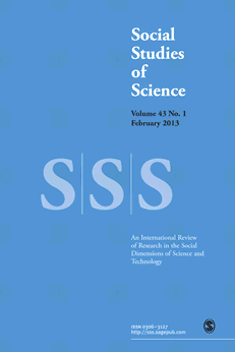
SOCIAL STUDIES OF SCIENCE
Scope & Guideline
Exploring the Nexus of Science and Society
Introduction
Aims and Scopes
- Sociotechnical Imaginaries:
The journal emphasizes the concept of sociotechnical imaginaries, exploring how collective visions shape and are shaped by societal values, technological practices, and scientific advancements. - Governance and Policy Analysis:
A core focus is on the governance of science and technology, analyzing how policies are formed, implemented, and contested, particularly in areas like health, environment, and security. - Public Engagement with Science:
The journal examines the role of public participation and lay expertise in scientific processes, highlighting how communities engage with scientific knowledge and technology. - Critical Perspectives on Innovation:
There is a consistent focus on the implications of innovation, particularly how new technologies affect social structures, power dynamics, and ethical considerations. - Historical and Cultural Analysis:
The journal also engages with historical and cultural studies of science, investigating how past events and cultural narratives influence current scientific practices and technological developments.
Trending and Emerging
- Health Innovations and Biopolitics:
An increasing focus on health innovations, particularly in the context of precision medicine and public health governance, highlights the intersection of technology, ethics, and individual rights. - Digital and Data Governance:
The rise of data-driven technologies has led to a growing body of work on digital governance, privacy concerns, and the implications of big data in various societal contexts. - Environmental Sustainability and Technoscience:
Emerging themes related to environmental governance and sustainable technologies reflect a heightened awareness of ecological crises and the role of science in addressing these challenges. - Ethics and Responsibility in Technology:
There is a marked increase in discussions regarding the ethical implications of emerging technologies, particularly in AI and biotechnology, emphasizing the need for responsible innovation. - Indigenous Knowledge and Decolonization:
Recent publications are increasingly engaging with Indigenous knowledge systems and the politics of decolonization, reflecting a broader commitment to inclusivity and diverse epistemologies in the study of science and technology.
Declining or Waning
- Traditional Science Communication:
There has been a noticeable decline in papers focused on traditional science communication strategies, as the field moves towards more nuanced examinations of public engagement and participatory approaches. - Purely Theoretical Frameworks:
Papers relying solely on theoretical frameworks without empirical grounding have become less frequent, indicating a trend towards more applied research that addresses real-world issues. - Historical Analysis of Established Scientific Disciplines:
While historical perspectives remain relevant, there is less emphasis on the histories of well-established scientific disciplines, as contemporary issues and emerging technologies take precedence.
Similar Journals
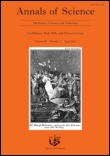
ANNALS OF SCIENCE
Advancing Understanding of Scientific EvolutionANNALS OF SCIENCE, published by Taylor & Francis Ltd, is a pivotal journal in the field of the History and Philosophy of Science, as evidenced by its Q3 categorization and a respectable Scopus rank of 99 out of 223, placing it in the 55th percentile among its peers. With a rich history dating back to its initial publication in 1936, the journal has made significant contributions to scholarly discourse, providing a platform for researchers and academics to explore the intricate connections between scientific developments and philosophical inquiries. The journal's commitment to rigorous academic research ensures that it remains a vital resource for professionals, educators, and students dedicated to understanding the evolution of scientific thought. Although it operates under traditional subscription models, the journal's importance in shaping modern scientific discussions cannot be overstated, making it an essential read for those engaged in the multifaceted study of science's history and philosophical implications.

JOURNAL OF THE HISTORY OF BIOLOGY
Exploring the Roots of Biological DiscoveryJOURNAL OF THE HISTORY OF BIOLOGY, published by Springer, stands as a vital academic resource devoted to examining the historical development of biological science and its philosophical dimensions. This esteemed journal, which has been in continuous publication since 1968 and encompasses research through 2024, is recognized for its significant contributions to the fields of Agricultural and Biological Sciences, and the History and Philosophy of Science, proudly holding a Q2 ranking in both categories as of 2023. With an ISSN of 0022-5010 and an E-ISSN of 1573-0387, it serves a diverse audience of researchers, professionals, and students interested in the interplay between biological advancements and historical context. The journal’s particular emphasis on interdisciplinary investigation provides a platform for innovative scholarship that enriches our understanding of not only the science itself but also its societal implications. While it does not currently offer open access, the rigor and reputation of the journal underscore its importance as a leading publication in the academic landscape of biological history.
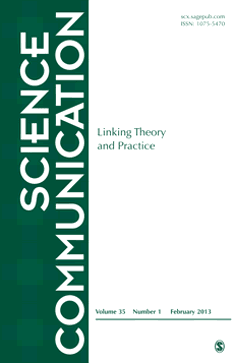
SCIENCE COMMUNICATION
Exploring the Dynamics of Science and Public UnderstandingSCIENCE COMMUNICATION is a premier journal that has established itself as a vital platform for the exploration of the intersection between science, society, and communication practices. Published by SAGE Publications Inc, this journal boasts a commendable impact within the field, evidenced by its 2023 ranking as Q1 in Sociology and Political Science, placing it in the top percentile of its category. With an impressive Scopus rank of 14 out of 1466 in the social sciences domain, it serves as an essential resource for researchers, professionals, and students dedicated to understanding how scientific information is communicated and perceived across various platforms and audiences. Spanning a rich publication history from 1979 to 2024, SCIENCE COMMUNICATION publishes original research, case studies, and reviews that contribute to the development of effective communication strategies in science. Although the journal does not currently offer open access options, its content remains pivotal for fostering informed discourse within academia and beyond. Engaging with this journal is invaluable for anyone interested in enhancing science literacy and engagement in contemporary issues.
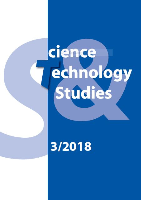
Science and Technology Studies
Pioneering Critical Analyses for a Complex WorldScience and Technology Studies, an esteemed journal published by the Finnish Society for Social Science & Technology Studies, is a leading platform in the fields of History and Philosophy of Science, as well as Multidisciplinary studies. Since transitioning to an Open Access model in 2012, the journal has been committed to disseminating high-quality research accessible to a global audience, fostering international discourse and collaboration. With an impressive Scopus ranking placing it in the top 10th percentile (Rank #22 out of 223) within its categories, it showcases pioneering research and critical analyses that illuminate the complex interplay between science and societal dynamics. Located in Tampere, Finland, the journal serves as an essential resource for researchers, professionals, and students alike, aiming to advance understanding and innovation in science and technology studies through interdisciplinary engagement.
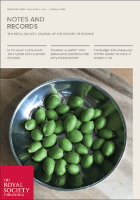
Notes and Records-The Royal Society Journal of the History of Science
Charting the Historical Landscape of ScienceNotes and Records - The Royal Society Journal of the History of Science is an esteemed scholarly journal published by the Royal Society in the United Kingdom, focusing on the historical aspects of science and its impact on modern scientific practices. With an ISSN of 0035-9149 and E-ISSN 1743-0178, this journal serves as a vital platform for researchers, professionals, and students who seek to explore the intricate connections between historical developments and contemporary scientific discourse. Recognized for its academic rigor, it holds a commendable position in the Q3 category of the History and Philosophy of Science field, ranking #56 out of 223 according to Scopus, and showcasing a 75th percentile ranking. Covering converged years from 1970 to 1973 and from 1975 to 2024, the journal publishes articles that contribute significantly to the understanding of the evolution of scientific thought. While it currently does not operate under an open access model, its esteemed content continues to engage a broad readership, fostering a deeper appreciation for the history behind scientific innovation and inquiry.

SCIENCE AS CULTURE
Challenging Perspectives: The Intersection of Science and CultureSCIENCE AS CULTURE is a distinguished journal published by Routledge Journals, Taylor & Francis Ltd, focusing on the interdisciplinary intersections of science and culture since its inception in 1987. With an ISSN of 0950-5431 and an E-ISSN of 1470-1189, the journal has established a strong reputation in various academic fields, most notably holding Q1 rankings in Cultural Studies, Health (Social Science), History and Philosophy of Science, and Sociology and Political Science. The journal aims to provide a platform for innovative research that critically examines the social, cultural, and political dimensions of scientific practices and knowledge. Despite not being an Open Access publication, it remains accessible to a wide audience, bolstered by its impressive impact factor and the rigorous peer-review process that ensures the quality of published articles. As a key resource for researchers, professionals, and students alike, SCIENCE AS CULTURE invites contributions that challenge traditional perspectives and stimulate dialogue across the sciences and humanities.
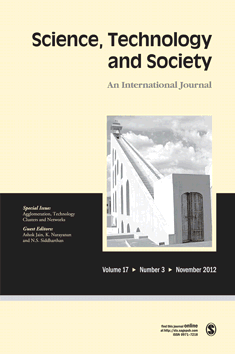
Science Technology and Society
Connecting Research with Real-World ImplicationsScience Technology and Society is a premier multidisciplinary journal published by SAGE Publications India Pvt Ltd, focusing on the intersection of scientific advancements and societal implications. With its ISSN of 0971-7218 and E-ISSN of 0973-0796, the journal is recognized for fostering scholarly discourse and critical analyses from diverse perspectives, serving as a vital resource for researchers, professionals, and students alike. With a distinguished Q1 category ranking in the multidisciplinarity discipline and an impressive 79th percentile among 171 journals, it stands out for its rigorous peer review process and impactful contributions to the field. The journal has been in continuous publication from 1996 to 2004 and from 2006 to 2024, underlining its ongoing relevance and commitment to exploring how technology shapes society and vice versa. Although currently offering subscription access, it remains dedicated to providing researchers with innovative insights that bridge gaps between technology and social contexts, making it an essential addition to the academic community's libraries.

Spontaneous Generations-Journal for the History and Philosophy of Science
Illuminating the Past to Understand the Future of ScienceSpontaneous Generations: Journal for the History and Philosophy of Science is a dedicated publication focusing on the rich fields of history and philosophy within the scientific domain. Published by the Institute for the History and Philosophy of Science and Technology, this journal provides a vital platform for scholars, researchers, and students to explore and disseminate ideas that bridge the historical context and philosophical inquiries of scientific practices. With its commitment to open access, Spontaneous Generations ensures that groundbreaking research is widely available, fostering an environment of collaboration and knowledge sharing. Aiming to engage a diverse audience, this journal is pivotal for those looking to understand the evolution of scientific thought and its implications on contemporary issues, making it an essential resource in the academic community.

East Asian Science Technology and Society-An International Journal
Illuminating the Interplay of Science and Society in East AsiaEast Asian Science Technology and Society - An International Journal, published by Taylor & Francis Inc, is a premier interdisciplinary platform focusing on the dynamic interplay between science, technology, and society in East Asia. Since its inception in 2008, this journal has established itself as a critical resource in the field, holding a distinguished position with an impact factor that reflects its relevance and contribution within the Q2 quartile of Social Sciences (miscellaneous) as of 2023. Researchers and scholars are invited to explore comprehensive analyses, case studies, and theoretical insights that address significant socio-technological challenges and developments unique to the region. Although currently not open access, articles are accessible to institutional subscribers, facilitating the dissemination of knowledge among professionals and students alike. With a Scopus rank of #114 out of 275 in General Social Sciences and a resilient engagement with ongoing academic discourse, the journal is your gateway to understanding trends that shape the future of East Asian societies.

CENTAURUS
Fostering Intellectual Engagement in the History of ScienceCENTAURUS is a prestigious journal dedicated to the History and Philosophy of Science, published by BREPOLS PUBL in the United States. With a storied history dating back to its inception in 1950, CENTAURUS has consistently provided a platform for critical engagement and scholarly discourse in the realm of scientific development and its philosophical implications. Recognized for its academic rigor, the journal holds a commendable Q2 ranking in the History and Philosophy of Science category for 2023, reflecting its substantial contribution to the field, as evidenced by its ranking in the top 11% of 223 journals in Scopus. Although it operates on a subscription-based model, the journal is a vital resource for researchers, professionals, and students seeking insightful analyses and discussions on the interplay between science and its philosophical dimensions. Published from Turnhout, Belgium, CENTAURUS continues to shape the landscape of scientific thought with its well-curated articles that examine over a decade's worth of scholarly contributions.